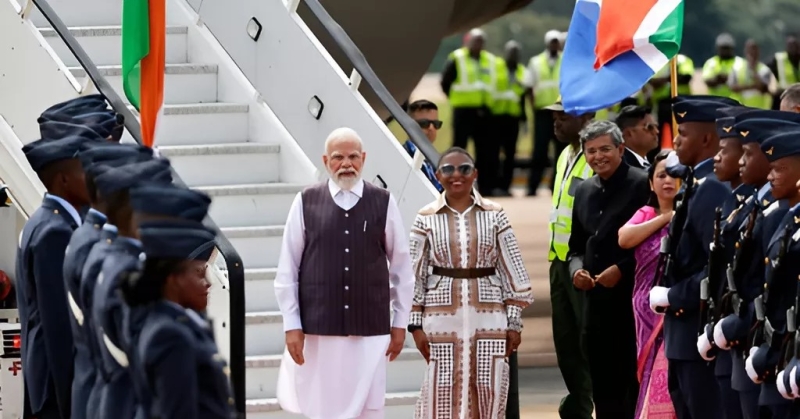- Dhaka Quake Leaves 10 Dead and Hundreds Injured |
- Fire at UN climate talks in Brazil leaves 13 with smoke inhalation |
- 5mmcfd gas to be added to national grid from Kailashtila gas field |
- ArmArmed Forces Day: Tarique's message draws on historic closeness |
- UNGA urges renewed int’l efforts for a resolution of Rohingya crisis |
Africa Hosts First G20 as US Boycott Sparks Tension

Indian Prime Minister Narendra Modi, left, is welcomed by Khumbudzo Ntshavheni, Minister in the Presidency on his arrival at the Air Force Base Waterkloof, near Pretoria, South Africa, Friday Nov. 21, 2025, ahead of the G20 Summit.
World leaders gathered in Johannesburg on Friday for the first-ever G20 summit hosted on African soil, an event intended to spotlight the challenges facing developing nations. However, the summit opened under a cloud of tension following a boycott by the United States.
Washington withdrew from the meeting after accusing South Africa of persecuting its white Afrikaner minority, a claim Pretoria has strongly rejected. The U.S. branded the summit a “disgrace,” with President Donald Trump ordering the boycott. Despite its absence, the United States is set to assume the G20 presidency after the Johannesburg gathering.
South African President Cyril Ramaphosa said his country would not be “bullied” into altering its leaders’ declaration—an annual, non-binding document outlining the broad areas of consensus reached by G20 members. This year’s agenda prioritises climate change, mounting debt burdens in poorer countries, and widening global inequality.
UN Secretary-General António Guterres, attending the summit, urged wealthy nations to take stronger action to support developing economies. “Many developing countries, especially in Africa, find themselves at the bottom of value chains,” he said, stressing that G20 reforms could help correct long-standing structural imbalances.
Despite the U.S. boycott, several key leaders—including Germany’s Chancellor Friedrich Merz and Australia’s Prime Minister Anthony Albanese—underscored the importance of cooperation and open trade. The European Union also signed a new critical minerals agreement with South Africa ahead of the summit.
China and Russia have sent high-level delegations, deepening their engagement on the continent, though Presidents Xi Jinping and Vladimir Putin are not attending. Analysts say the U.S. withdrawal could accelerate a shift among developing countries toward alternative global partners.
Addressing the absence of Washington, Ramaphosa said simply: “Their absence is their loss.”

